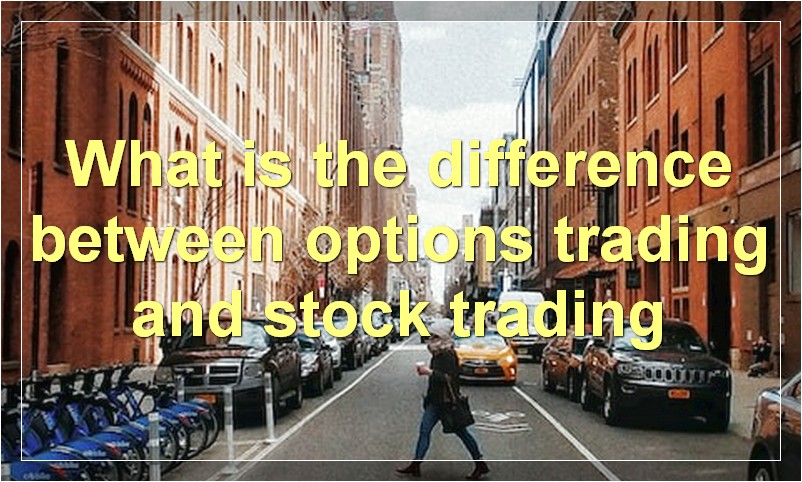If you’re thinking about getting into options trading, there are a few things you need to know. First, options trading is a bit more complex than other types of trading, so it’s important to do your research before getting started. Second, you’ll need to have a firm understanding of the risks involved in options trading. And finally, you’ll need to be aware of the potential rewards that come with options trading. With that said, let’s take a closer look at each of these three things.
What is options trading
Options trading is a type of trading that allows you to speculate on the direction of an underlying asset, without actually owning the asset itself. Options are derivative contracts, which give you the right but not the obligation to buy or sell an asset at a set price on or before a certain date.
If you’re new to options trading, it’s important to understand the basics before you get started. This article will give you a brief overview of what options trading is and how it works.
What are the benefits of options trading

There are many benefits of options trading, including the ability to control a large amount of stock with a relatively small investment, the ability to make money in both rising and falling markets, and the ability to hedge against losses.
Options trading can be a great way to control a large amount of stock with a relatively small investment. This is because when you buy an option, you are not buying the actual stock, but rather the right to buy or sell the stock at a specific price. This means that you can control 100 shares of stock for every option contract that you purchase. So, if you only have $1,000 to invest, you could still control $10,000 worth of stock by buying 10 option contracts.
Another benefit of options trading is that you can make money in both rising and falling markets. If you think a stock is going to go up in value, you can buy a call option, which gives you the right to buy the stock at a specific price. If the stock does indeed go up in value, you can then sell the option for a profit. On the other hand, if you think a stock is going to go down in value, you can buy a put option, which gives you the right to sell the stock at a specific price. If the stock does indeed go down in value, you can then sell the option for a profit.
Finally, options trading can also be used to hedge against losses. For example, let’s say that you own 100 shares of XYZ stock, which is currently worth $1,000. You are worried that the stock might go down in value so you decide to buy a put option with a strike price of $950. This gives you the right to sell your XYZ shares for $950 even if the market price falls below that level. So, if the stock does indeed fall to $900 per share, you would still be able to sell your shares for $950 each and would only lose $50 on your investment. This is much better than losing the entire $1,000 that you would have lost if you had just held on to your shares without buying the put option.
As you can see, there are many benefits of options trading. While it is not suitable for everyone, it can be a great way to make money in both rising and falling markets and to hedge against losses.
What are the risks of options trading
Options trading is a type of investing that allows investors to buy and sell options, which are contracts that allow the holder to buy or sell an asset at a specified price within a certain time period. While options trading can be a profitable way to invest, it also carries a number of risks.
One of the risks of options trading is that the value of the options contract can fluctuate rapidly, and this can lead to losses for the investor. Another risk is that the investor may not be able to sell the option when they want to, as there may not be another buyer willing to pay the price they are asking. Finally, if the underlying asset does not perform as expected, the option may expire worthless, leaving the investor with no return on their investment.
What is the best strategy for options trading
The best strategy for options trading is to have a clear understanding of what you want to achieve and how you plan to achieve it. You need to identify your goals and objectives, and then develop a plan that will help you reach those goals. Your plan should include an analysis of the market, your risk tolerance, and your investment objectives. Once you have developed your plan, you need to stick to it and trade accordingly.
What are the most common mistakes made when options trading
Some of the most common mistakes made when options trading include:
1. Not knowing what you’re doing – This is perhaps the most common mistake made by novice options traders. Without a solid understanding of how options work, it’s very easy to make costly errors when trading.
2. Over-trading – Another common mistake is to trade too often. Just because you have the ability to trade doesn’t mean you should be making multiple trades every day. Options trading should be done in a strategic and thoughtful manner, not haphazardly.
3. Focusing on the short-term – Many options traders get caught up in trying to make quick profits and they don’t take the time to think about the long-term implications of their trades. This can lead to poor decision-making and ultimately, losses.
4. Not having a plan – A successful options trader needs to have a well-defined trading plan that outlines their goals, strategies and risk management rules. Without a plan, it’s very easy to make impulsive and unwise decisions when trading.
5. Not managing risk properly – Risk management is essential when trading options. Many novice traders make the mistake of not managing their risk properly, which can lead to big losses.
6. letting emotions influence your trading – When it comes to options trading, it’s important to remain calm and objective. letting your emotions influence your trading decisions is a surefire way to lose money.
What is the difference between options trading and stock trading

There are many differences between options trading and stock trading. For starters, options trading is a type of derivative trading, meaning that its value is based on an underlying asset. Stock trading, on the other hand, is the buying and selling of shares of a company on the stock market.
Options trading is generally a more complex form of trading than stock trading, as there are more variables to consider. When trading options, traders must take into account the option’s strike price, expiration date, and volatility. Stock traders only need to worry about the price of the shares they are buying or selling.
Another key difference is that options trading can be done on margin, meaning that traders can control a larger position than they could with stock trading. This leverage can lead to higher profits, but also higher losses.
Finally, options trading is often used as a hedging tool by investors. By buying put options, for example, investors can protect their portfolio from a decline in the stock market. Stock traders do not have this same level of protection.
What are some tips for success in options trading
In order to be successful in options trading, there are a few things that you need to keep in mind. First of all, you need to have a clear understanding of what options are and how they work. Secondly, you need to be aware of the different types of options contracts that are available. Thirdly, you need to have a solid understanding of the market conditions that can impact the price of an option. Lastly, you need to have a good risk management strategy in place in order to protect your capital.
How can I learn more about options trading
There are a few things you can do to learn more about options trading. You can read books or articles on the subject, attend seminars or webinars, or even take classes.
The best way to learn, however, is to simply start trading. By getting your feet wet and actually executing some trades, you’ll start to get a feel for how the market works and what strategies work best for you. Of course, it’s important to do your research beforehand and have a solid understanding of the basics before you start trading. But once you get started, you’ll be surprised at how much you can learn by just doing it.
What resources are available to help me with options trading
When it comes to options trading, there are a few different resources that can be helpful. One great resource is the Options Industry Council, which offers educational materials and resources on options trading. Additionally, brokerage firms that offer options trading platforms will typically have their own set of resources and educational materials available to help customers get started. Finally, there are a number of online forums and websites dedicated to options trading where experienced traders can share tips and advice.
What are some things I should avoid when options trading
When options trading, there are a few things to avoid in order to be successful. First, avoid overtrading. This means don’t trade just for the sake of trading, but only make trades when you see a good opportunity. Second, avoid letting emotions influence your trading. This means don’t get too excited when you make a profit or too discouraged when you lose money. Third, avoid being greedy. This means don’t try to make too much money on one trade, but instead focus on making consistent profits. Finally, avoid being too risky. This means don’t put all your money on one trade, but instead spread it out so that you can afford to lose some and still make a profit.

